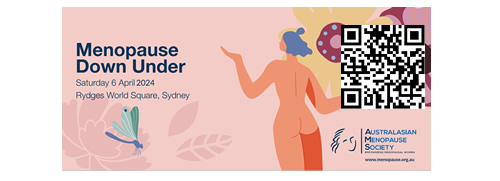The Lancet has published a series on menopause which cautions against the ‘over medicalisation’ of menopause, and calls for an empowerment model.
AMS agrees that we need to empower women to manage their menopause transition, their post-menopausal health and well-being, and indeed has been promoting this for decades (see the AMS tagline – “Empowering menopausal women”). However, over 25% of women will have moderate to severe symptoms that impact on their quality of life. Menopausal hormone therapy remains an evidence-based, first line treatment option for women with symptoms.
AMS and IMS Past-Presidents, Professors Susan Davis AO and Rod Baber AM have kindly shared a response to the series.
Response
Four papers published pertaining to menopause in the Lancet are not about new research findings but offer opinions as to how menopause might be viewed and how the experience of menopause might be optimised.
It is disappointing that the lead article states that “the principles of health empowerment have not been applied to menopause” when empowerment of women to best navigate their menopause, through the provision of credible health information to support informed and shared decision-making, has been the focus of national and international organisations (such as the Australasian and International Menopause Societies and Jean Hailes for Women’s Health) for many years.
The papers raise the important concern of potential misattribution of an array of psychological symptoms to menopause. While this is also not a new concept, it is consistent with other recently published reviews and highlighting this concern reinforces the message to women and clinicians not to blame every symptom on menopause.
The authors stress that most women will not experience debilitating menopausal symptoms. Nevertheless, they acknowledge that 60-80% of women will have menopausal flushes and sweats that can last, on average, about 7 years, and that for 1 in 3 women these can be quite severe.
The authors caution against “over-medicalisation” of the menopause but the messaging regarding therapy is mixed and potentially confusing. For example, it is stated that “The North American Menopause Society recommends specific MHT, gabapentin and oxybutynin which have mild to moderate efficacy and reduce hot flushes by 1-2 per day with no significant improvement in menopause-related quality of life”. But, further on it is stated that MHT is effective (reduces flushes by 2-4/day) and improves health related quality of life. Of concern is the promotion of gabapentin and oxybutynin, neither of which are approved in any country for the treatment of menopausal flushes/sweats (vasomotor symptoms) and data for oxybutynin is notably scant. In contrast fezolinetant, which has been approved in the UK, EU, Australia and the US specifically for vasomotor symptoms, has been downplayed to being only modestly effective despite robust evidence which is lacking for these other nonhormonal therapies.
The importance of bone loss at menopause is also recognised together with the effectiveness of MHT for fracture prevention, but other long-term effects of menopause on health are called to question. This conflicts with other highly regarded expert opinions1,2 and this in turn demonstrates that this Lancet series needs to be seen as only one interpretation of the published research.
The authors seem determined to minimise the important role of MHT in helping many women as they reach menopause. They ignore other published systematic reviews which all agree that MHT is the most effective treatment for vasomotor symptoms, is as effective as other bone-specific therapies (antiresorptive agents) in reducing postmenopausal osteoporosis and associated fractures and, unlike some antiresorptives, is not associated with an increased risk of fracture upon stopping treatment.
Current guidance from international and national menopause societies, including Australia and New Zealand all speak to empowerment of every woman at this pivotal stage of her life. They also stress the importance of an evidence-based approach and, importantly, offering each woman the care, support and, where required, treatment she seeks to help her on her journey.
Nonetheless, in general these papers align with, and support the latest internationally and nationally endorsed best practice guidance for menopause published in 2023, Practitioner Toolkit for Managing Menopause3, with open online access for women and clinicians to facilitate health empowerment, as recommended by these papers.
- Mehta JM, Manson JE. The menopausal transition period and cardiovascular risk. Nat Rev Cardiol 2024; 21(3): 203-11.
- Gersh F, O'Keefe JH, Elagizi A, Lavie CJ, Laukkanen JA. Estrogen and cardiovascular disease. Prog Cardiovasc Dis 2024.
- Davis SR, Taylor S, Hemachandra C, et al. The 2023 Practitioner's Toolkit for Managing Menopause. Climacteric 2023; 26(6): 517-36.
Professor Susan Davis AO MBBS, FRACP, PhD, FAHMS
NHMRC Investigator
Professor and Director, Women's Health Research Program
Department of Epidemiology and Preventive Medicine
School of Public Health and Preventive Medicine
Professor Rodney Baber AM B Pharm. MB BS FRCOG FRANZCOG
Professor of Obstetrics and Gynaecology
Faculty of Medicine and Health
The University of Sydney.
Past President IMS
Chair, Scientific Programme Committee
19th IMS World Congress on Menopause.
Disclosures:
Professors Davis and Baber are both past Presidents of the International Menopause Society and Australasian Menopause Society. Prof Davis is an NHMRC Leadership 3 Investigator.
SRD has prepared and delivered educational presentations for Besins Healthcare, Abbott, Mayne Pharma, has been on Advisory Boards for Theramex, Astellas, Abbott Laboratories, Mayne Pharma and Gedeon Richter and has received institutional grant funding for Que Oncology and Ovoca Bio research. RJB has prepared and delivered educational presentations for Besins Healthcare, Abbott, Viatris, and Pfizer Australia and has served on medical advisory boards for Theramex, Mayne Pharma, Astellas and Besins Healthcare
Content created 6 March 2024






